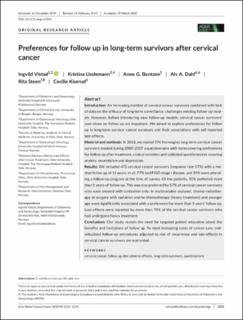Preferences for follow up in long-term survivors after cervical cancer
Vistad, Ingvild; Lindemann, Kristina; Bentzen, Anne Gry; Dahl, Alv A; Steen, Rita; Kiserud, Cecilie E.
Journal article, Peer reviewed
Published version

Åpne
Permanent lenke
https://hdl.handle.net/11250/2761480Utgivelsesdato
2020Metadata
Vis full innførselSamlinger
- Department of Clinical Science [2318]
- Registrations from Cristin [9791]
Originalversjon
Acta Obstetricia et Gynecologica Scandinavica. 2020, 99 (9), 1253-1259. 10.1111/aogs.13855Sammendrag
Introduction
An increasing number of cervical cancer survivors combined with lack of data on the efficacy of long-term surveillance, challenges existing follow-up models. However, before introducing new follow-up models, cervical cancer survivors’ own views on follow up are important. We aimed to explore preferences for follow up in long-term cervical cancer survivors and their associations with self-reported late-effects.
Material and methods
In 2013, we mailed 974 Norwegian long-term cervical cancer survivors treated during 2000-2007 a questionnaire with items covering preferences for follow up after treatment, clinical variables and validated questionnaires covering anxiety, neuroticism and depression.
Results
We included 471 cervical cancer survivors (response rate 57%) with a median follow up of 11 years. In all, 77% had FIGO stage I disease, and 35% were attending a follow-up program at the time of survey. Of the patients, 55% preferred more than 5 years of follow up. This was also preferred by 57% of cervical cancer survivors who were treated with conization only. In multivariable analyses, chemo-radiotherapy or surgery with radiation and/or chemotherapy (heavy treatment) and younger age were significantly associated with a preference for more than 5 years’ follow up. Late effects were reported by more than 70% of the cervical cancer survivors who had undergone heavy treatment.
Conclusions
Our study reveals the need for targeted patient education about the benefits and limitations of follow up. To meet increasing costs of cancer care, individualized follow-up procedures adjusted to risk of recurrence and late-effects in cervical cancer survivors are warranted.
